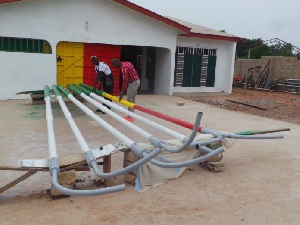Wenchi is one of the prominent towns in the Brong Ahafo Region with vast land area, especially farmlands. The town is largely known for the cultivation of crops like cashew, yam, mango and vegetables.
The rich raw materials base for agro-processing at Wenchi and its immediate environs once made the town a suitable environment for an industrial setting (agro-processing companies). Notable among some defunct factories in town are Wenchi Tomato Processing Company, Pioneer Tobacco (PT) Company and Cashew processing plants.
Notwithstanding the huge potential of Wenchi as an industrial town, the community has been starved of industrial activities since collapse of the aforementioned companies. The development has over the years compounded the unemployment situation there, compelling most youth of the town to seek greener pastures elsewhere – especially in the North Africa and Gulf Regions.
Profile of an entrepreneur
A hungry young man from Wenchi, Emmanuel Boama – 20 then, was struggling to find his feet in life some years after completing Junior High School; he made an adventurous journey to the Maghreb, hopping from Libya to Tunisia and Algeria to Morocco. He desperately crossed the Mediterranean Sea to Spain in 1998, continued to Austria and settled there.
Young Boama subsequently got married to an Austrian woman who helped him to enrol in a school to learn the German language in order to break communication barrier. He later received training in an Austrian Technical Institution which earned him employment in a steel company. He had been trained as steel bender in Ghana after his JHS education, and therefore working in an industrial steel company was a progression.
After years of on-the-job experience coupled with hard work, Emmanuel became a key asset for his company. The company had taken him across borders to countries like Germany, Slovenia, Slovakia and the Czech Republic to work with affiliate industries there. He had always haboured the dream of coming back home to impart his knowledge and experience to Ghanaian youth.
Establishment of the company
In 2017, industrious Emmanuel finally returned to his motherland – Wenchi – to establish a metal fabrication factory. He was fascinated by the government’s industrialisation initiative ‘One District, One Factory’. With support from his Austrian counterpart, Emmanuel has been able to establish the factory christened ‘Jomik Sutmetal Company Limited’.
So far, over 150,000 euros of private capital has been invested in the company. Interacting with Business and Financial Times, Mr. Boama said: “My vision is not only to run this business to make profit, but ultimately to train despairing youth in order to discourage them from embarking on perilous trips to Libya and the Gulf region for non-existing jobs”.
Currently, the company has engaged twelve young illegal miners who are undergoing training. The twelve trainees were ‘victims’ of government’s crackdown on the illicit mining practice. The factory has the capacity to produce large quantities of assorted metal products. For instance, it can produce about 600 streetlight poles per week. The infant company has started with the production of streetlight poles for the Wenchi Municipal Assembly to replace broken ones.
Some other products that company has the capacity to manufacture include school desks, metal doors & frames, student beds, waiting-room chairs, electricity high-tension poles, transformer windows, and special security doors for banks and other financial institutions.
Challenges
The company has the ambition to become a leading supplier of metal products to the West African market, but it will need more sophisticated machines in order to improve and expand its production unit. The Managing Director, Emmanuel Boama, revealed that the company will in the interim require about 100,000 euros to procure the needed industrial machines. The company is willing to engage about 70 more people should it receive the necessary support.
The company is also yet to identify a guaranteed domestic market for it products. The entrepreneur strongly advocated national policy direction to, at least, order public institutions like schools, District Assemblies and hospitals to procure the above-mentioned required equipment from local companies. This, he indicated, will create the required market for domestic companies to thrive – and create more jobs as per the vision of government’s industrialisation drive.
Conclusion
“Growth is never by mere chance; it is the result of forces working together.” – James Cash Penney, founder, JC Penney once said. It is very important for government and all other relevant stakeholders to support the survival, growth and development of all infant companies like Jomik Sutmetal Company in order to bequeath the country all the benefits of industrialisation.
Business News of Friday, 18 May 2018
Source: thebftonline.com

















